Image credit: © Depositphotos.com/AndreyPopov
Especially last year, artificial intelligence (or AI for short) has taken over many areas of the internet and has been implemented in numerous apps. In addition to various methods and opportunities to use AI independently for learning, some providers have now firmly integrated it as a standard feature. And there are quite a few different, exciting approaches to using AI in language learning. We’ll show you the language courses that make the best use of this new technology.
Table of Contents
Context: AI in Language Learning – What’s It All About?
Important! Thanks to the AI boom, new offerings are constantly emerging. For instance, we’re seeing a wave of new AI conversation coaches. These are apps that function much like WhatsApp, where you chat with an AI. We have dedicated a separate article to these fantastic new language learning opportunities.
This article takes a look at more traditional language learning solutions that, now, use AI for learning, making their existing courses smarter in the truest sense of the word.
AI in Language Learning: The Best Providers
Gymglish has been working with artificial intelligence for years, and now, in recent months, several language courses have followed suit, each adapted to its own offering with very different implementations, features, and price points. Here are our top recommendations for language learning apps using AI!
Gymglish – A Different Approach to AI
Gymglish uses AI in language learning in its own unique way, as the user doesn’t interact with it directly in the course. Instead, artificial intelligence is used to determine your learning level as accurately as possible. To do this, after signing up, you receive one lesson per day for 7 days, each with varying levels of difficulty.
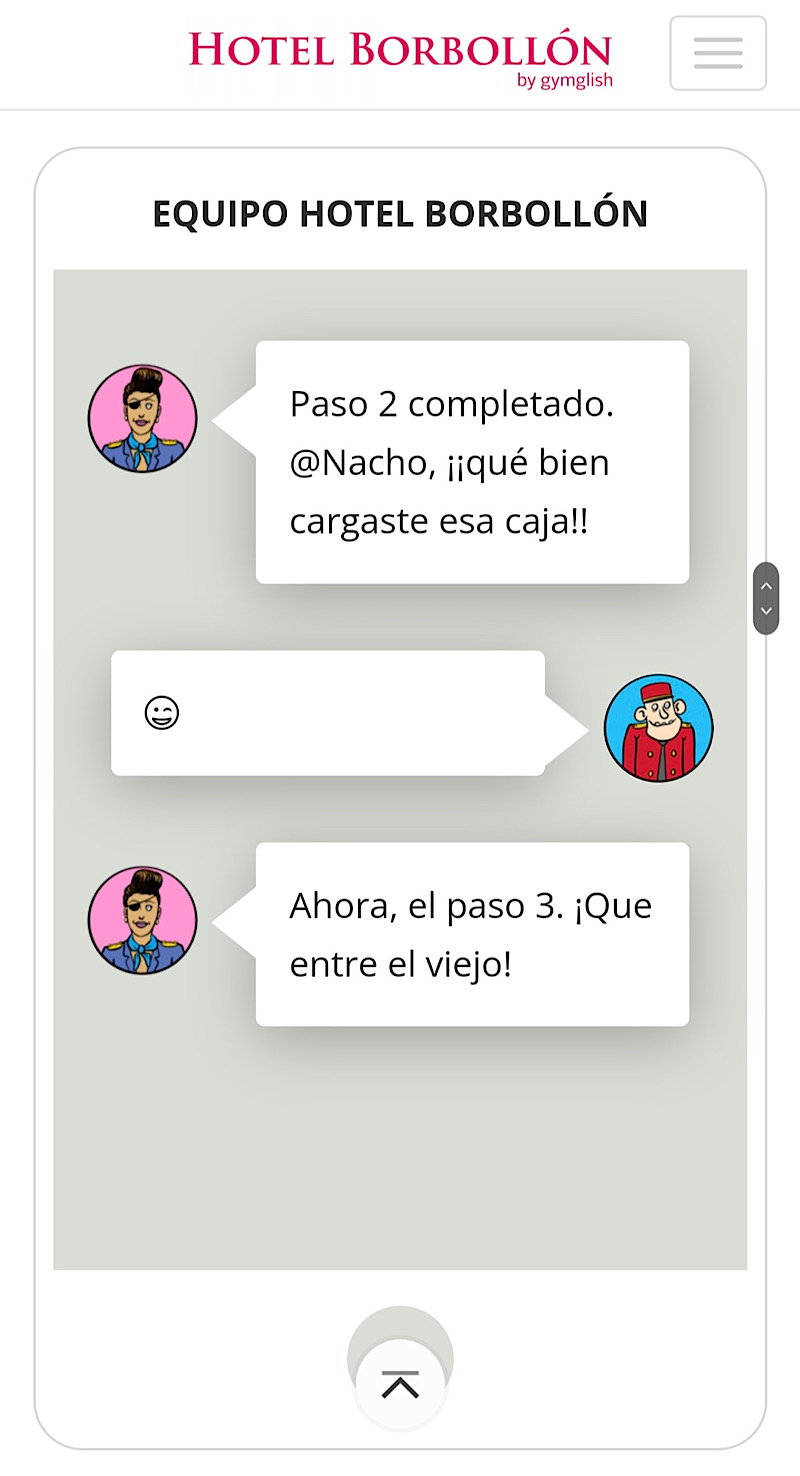
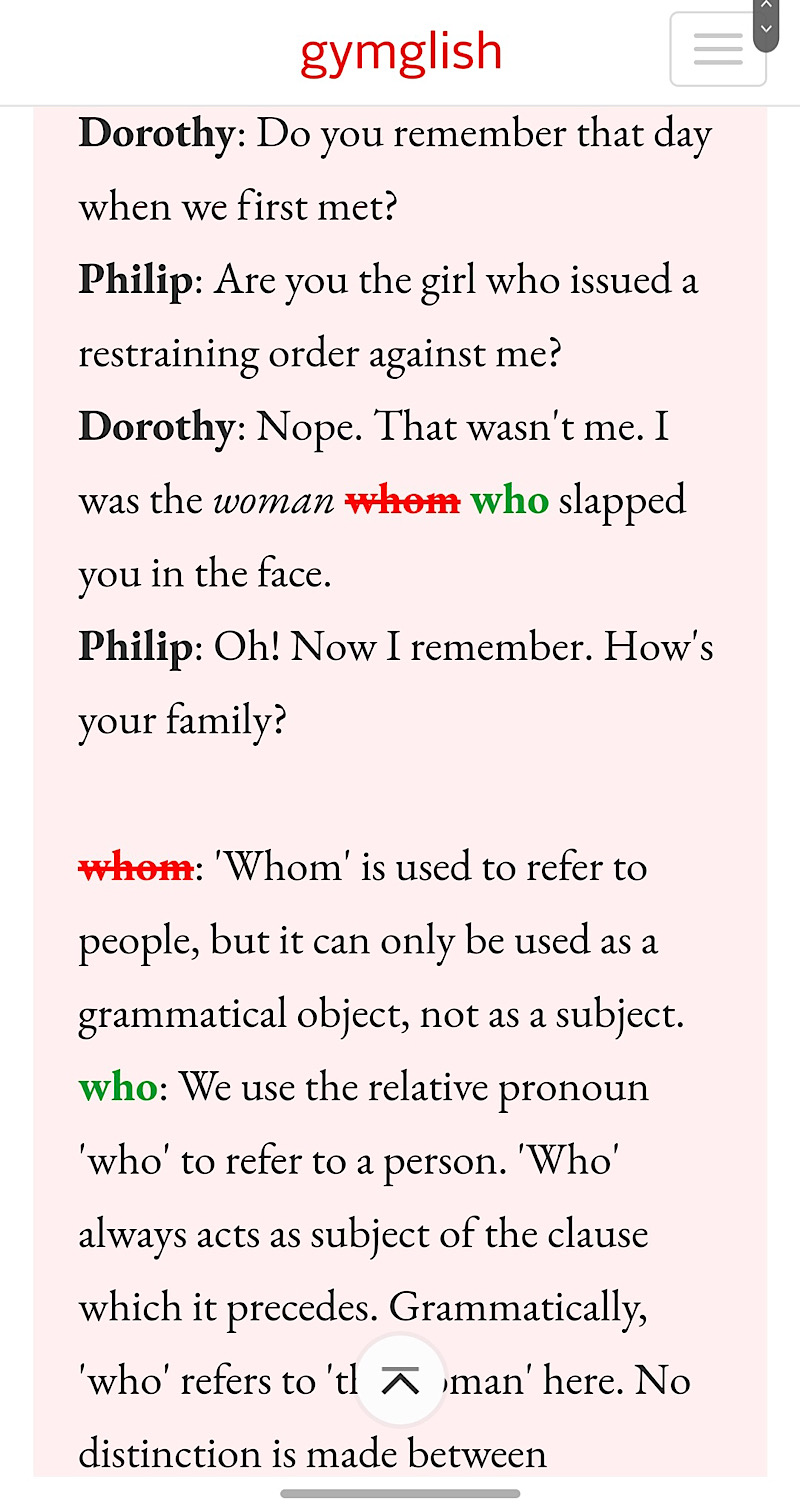
Afterward, Gymglish can calculate where you stand in the language based on your answers and mistakes, and tailor all further lessons precisely to you. So, after the first week, you not only get a detailed assessment of your proficiency level and a thorough explanation of your errors, but you are also supported and challenged in the course without ever being overwhelmed. A language course could hardly be more personal!
Additionally, the provider recently launched another feature: Aimigo Coach. This is AI usage in the classic sense, where you have a conversation with a virtual person. This character is always from the ongoing story told in the language course. Depending on your preference, you can discuss the past lesson, have grammatical points explained to you, or ask general questions.
In our review, the response behavior was extremely intelligent and perfectly tailored to the individual content of the language course – many other artificial intelligences are not yet this advanced. Excellent! However, the AI is only unlocked with the Premium and Gold subscriptions; the basic version does not have access to it. You can find the exact details and pricing tiers in our detailed review!
MosaLingua – Engaging Conversations with Aida
MosaLingua is essentially a vocabulary trainer, but it impresses with a wide range of additional features. And recently, this includes a sophisticated artificial intelligence for language learning, named Aida. With her, you can have interesting conversations that quickly move beyond boring small talk. The AI always caters to your interests and provides its own exciting prompts all in the foreign language!
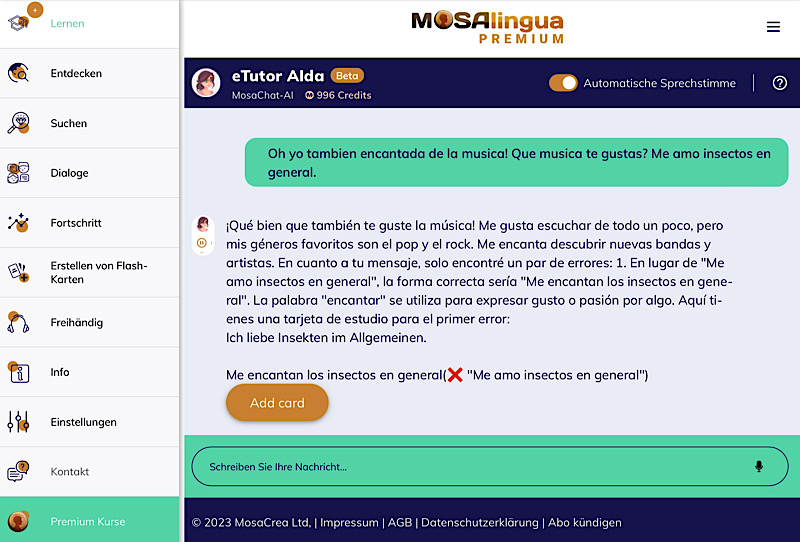
If you make a mistake, Aida corrects it by suggesting the grammatically correct version of the sentence. Despite the correction, she still understands what you meant to say and responds accordingly. This allows even beginners to have a fluent conversation. Again, excellent!
But that’s not all: the AI offers the ability to add the corrected sentence as your own flashcard directly within the conversation. This allows you to automatically personalize your flashcard deck – a comparable feature is currently not found anywhere else. This is a wonderful use of AI in language learning!

‒ The Best Language Course of 2025 ‒
We’ve tested dozens of language courses…
But only ONE takes the #1 spot!
Babbel – Mastering Pronunciation
Babbel is also joining the trend of language learning apps using AI. An artificial intelligence with two functions has recently become available for Android and iOS. In “Everyday Conversations,” the classic use of an AI is employed, allowing you to role-play various scenarios in a chat. For example, you can practice introducing yourself or navigating a restaurant visit in the foreign language.
The second function is speech recognition. As the name suggests, you can practice your own pronunciation here. The AI was trained on native speaker audio files and also takes into account different voice pitches and accents. This sounds promising and we are excited to see how Babbel develops with this in the coming months.
Mondly – Confident Speaking with LUNA
Mondly’s AI feature was recently integrated into the language course. Now, the artificial intelligence LUNA can support users on their journey to learning a foreign language. Initially, however, only in the English course and only in the app, not in the browser.
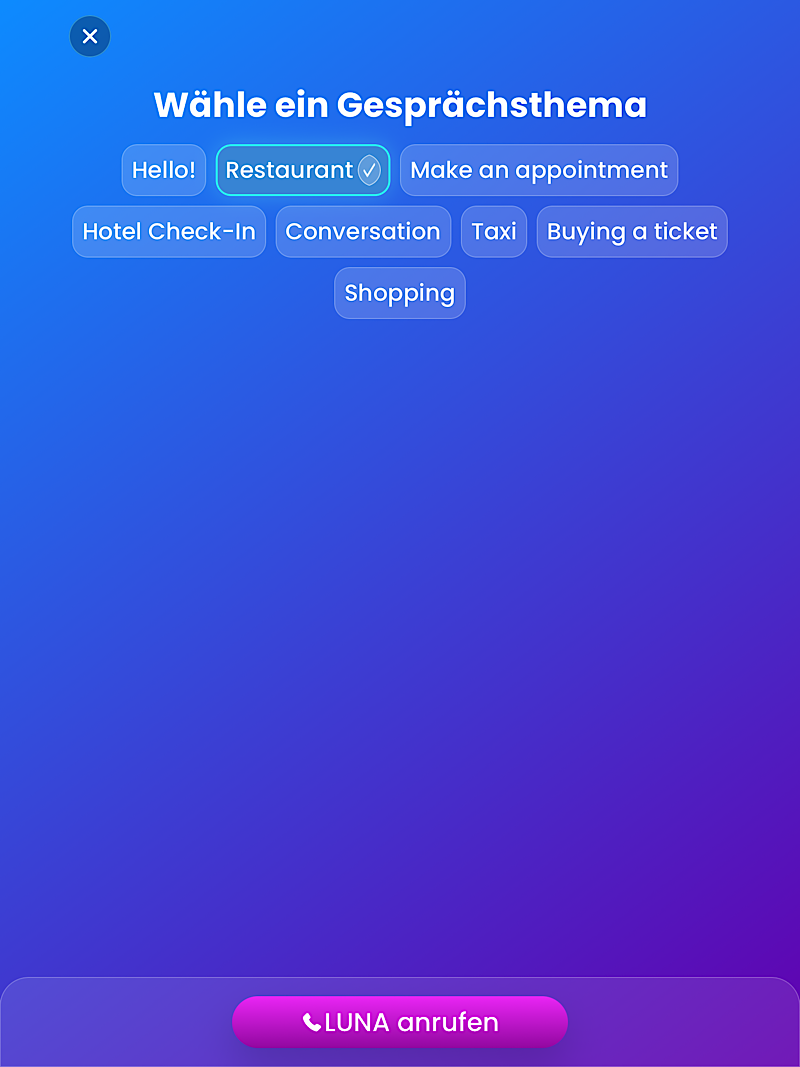
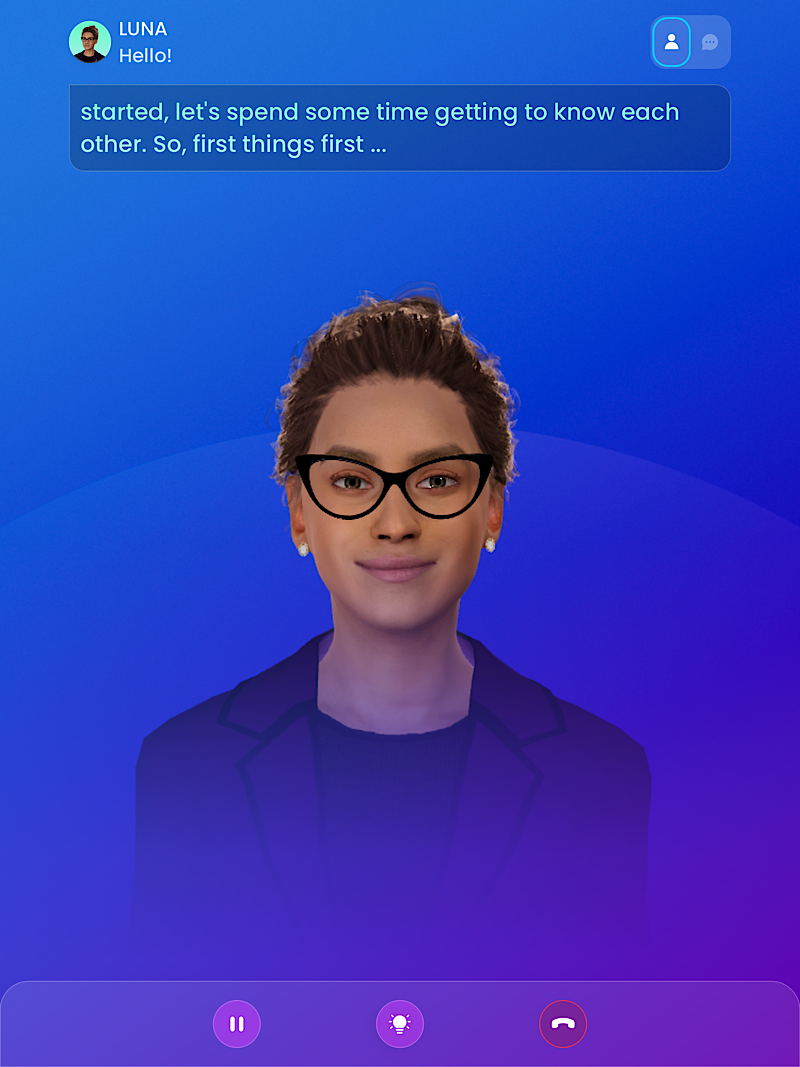
You can also speak with LUNA instead of just chatting. This trains your conversational flow and correct pronunciation, all without the awkward moments of searching for words with a human partner. After its release, everyone can learn with the AI for one lesson for free – afterward, LUNA is included in the Premium subscription and is available there with several pre-made dialogues.
The same applies if you have already purchased lifetime access in the past. This is very fair, as it offers excellent value for money, as shown in this overview of the costs of all language courses.
What Does the Future Hold?
Using artificial intelligence for language learning isn’t a new idea – but the possibilities are becoming ever broader thanks to publicly accessible and usable AIs. As a result, several providers are currently in the process of implementing various AI features into their courses. And these innovations have already been announced:
Duolingo – Error Correction and Conversations
Duolingo is also already using an artificial intelligence for language learning: With Duolingo Max, a subscription option priced even higher than Duolingo Super, you can already use the feature in some countries. In the future, the AI is expected to be available to users in Germany with its two features. First, you can have Duolingo Max explain your mistakes in a specific lesson.

‒ Language Course Discounts ‒
Find the best discounts and exclusive coupons for top
language courses here!
+ + + Limited-Time Deals +++ Some Offers Expiring Soon +++ Don’t Miss Out! + + +
This way, you not only see what was wrong but also learn why another answer would have been correct. This undoubtedly enhances the learning effect! Whether it will be as well-implemented as Gymglish’s, however, remains to be seen upon review.
The second way to use AI in language learning is the “Roleplay” function. Here, you can practice an everyday conversation with one of the Duolingo characters in a pre-selected scenario. In addition to the characters’ responses in the dialogue itself, you receive feedback with tips and suggestions for improvement at the end of the conversation.
Also practical: If the AI makes a mistake, it can be easily reported to Duolingo directly in the chat, and a human will review the corresponding message and correct it if necessary. This means you don’t just have to accept the AI’s answers – it isn’t infallible either. However, since Duolingo has disappointed us repeatedly in the past, one must look very closely at how concrete this human intervention actually is.
Conclusion – A Revolution in Language Learning?
It’s clear to see: the possibilities for using artificial intelligence in language learning are nearly endless. While Mondly, Babbel, and Duolingo primarily focus on conversation practice with a few of their own features here and there, there are now also some more creative approaches.
For instance, Gymglish bases its placement test and highly personalized lessons on the analytical capabilities of an AI. MosaLingua, on the other hand, also focuses on conversations with an AI but doesn’t impose a thematic framework or an end to the conversation. Here, you are completely free and can also add new, personal vocabulary cards directly from the chat. A brilliant move.
These are all exciting approaches that align with the personal use of AI and all have their own advantages. We are excited to see what else develops in the language learning market in the coming weeks, months, and years, and will, of course, keep you updated in our newsletter.

Pingback: LingQ Pricing Overview 2025: What You Need to Know